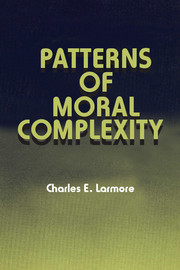Book contents
- Frontmatter
- Contents
- Preface
- Acknowledgments
- Chapter 1 MORAL JUDGMENT – AN ARISTOTELIAN INSIGHT
- Chapter 2 THE LIMITS OF NEO-ARISTOTELIANISM
- Chapter 3 LIBERALISM AND THE NEUTRALITY OF THE STATE
- Chapter 4 THE POLITICAL ORDER AND PERSONAL IDEALS
- Chapter 5 POLITICAL ROMANTICISM
- Chapter 6 THE HETEROGENEITY OF MORALITY
- CONCLUSION
- Notes
- Bibliography
- Index
Chapter 2 - THE LIMITS OF NEO-ARISTOTELIANISM
Published online by Cambridge University Press: 05 June 2012
- Frontmatter
- Contents
- Preface
- Acknowledgments
- Chapter 1 MORAL JUDGMENT – AN ARISTOTELIAN INSIGHT
- Chapter 2 THE LIMITS OF NEO-ARISTOTELIANISM
- Chapter 3 LIBERALISM AND THE NEUTRALITY OF THE STATE
- Chapter 4 THE POLITICAL ORDER AND PERSONAL IDEALS
- Chapter 5 POLITICAL ROMANTICISM
- Chapter 6 THE HETEROGENEITY OF MORALITY
- CONCLUSION
- Notes
- Bibliography
- Index
Summary
In the previous chapter I sought to show the significance of a central Aristotelian concept that modern ethical theories have tended to neglect. In so doing, I have meant to ally myself with neo-Aristotelian tendencies in recent moral thought. But there are limits to my enthusiasm for rehabilitating the Stagirite. These reservations will become most apparent if I discuss how my position differs from that of Alasdair MacIntyre's After Virtue, which is one of the most important and influential documents of contemporary neo-Aristotelianism.
MacIntyre believes that the loss of an Aristotelian perspective has led to a moral culture that is fragmented and rootless. “The new dark ages,” he writes, “are already upon us.” His diagnosis is so unqualifiedly bleak because for him the demise of Aristotelianism has not simply made us insensitive to certain parameters of moral life, such as virtue and judgment, whose importance I have just examined. He claims that it has calamitously stripped us of any objective conception of the end or purpose of human existence, any idea of the good life that morality can subserve. In MacIntyre's view, the recovery of Aristotelian ethics must include Aristotle's conviction that the question, What is human life lived at its best? has a single answer and that our success as moral beings depends upon understanding this answer.
- Type
- Chapter
- Information
- Patterns of Moral Complexity , pp. 22 - 39Publisher: Cambridge University PressPrint publication year: 1987



